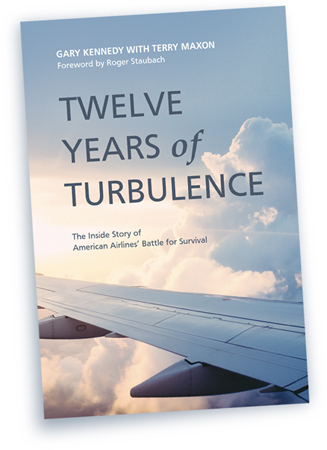© 2018 The Texas Lawbook.
By Mark Curriden
(Jan. 9) – Gary Kennedy was walking up five flights of stairs at American Airlines’ headquarters the morning of Aug. 13, 2013 when his cell phone buzzed with a new email.
Kennedy, who was guiding the airline through the treacherous waters of bankruptcy and restructuring, had told his CEO and corporate board that much of the Chapter 11 process was completely unpredictable, but there was one thing he knew for sure: federal approval of American’s proposed merger with US Airways “would be a walk in the park.”

“Holy shit,” Kennedy blurted out.
Kennedy issued a quick apology to a startled woman next to him on the stairs and then moved quickly toward the office of CEO Tom Horton to deliver the bad news that the U.S. Department of Justice was suing American to stop its merger with US Airways on antitrust grounds.
That vivid description is one of dozens of extraordinary behind-the-scenes stories Kennedy reveals in his new yet-to-be released book, Twelve Years of Turbulence: The Inside Story of American Airlines’ Battle for Survival, which will officially be released in early February.
The book – an exclusive copy of which has been obtained by The Texas Lawbook – tells the extraordinary story of American’s journey from the brink of insolvency following two of the airline’s jets used by terrorists in the Sept. 11, 2001 attacks through the most successful corporate bankruptcy and restructuring in U.S. history.
For 220-pages, Kennedy gives readers unprecedented access to closed-door corporate board meetings, internal discussions with executives, confidential legal strategy meetings and secret – and many times contentious – negotiations between American officials, its labor unions and executives with US Airways.

Twelve Years of Turbulence provides several surprising disclosures, including:
- American was minutes away from filing for bankruptcy in 2003, only to back away when the unions consented to wage reductions.
- The airline’s pilot union once blamed American’s management for the increased suicide rate among pilots.
- American officials actually talked with a flight attendant aboard Flight 11 from Boston to Los Angeles who slipped unnoticed to the back of the jet and called the airline from her personal cell phone to say that the plane had been hijacked, two flight attendants had been stabbed and the terrorists were in the cockpit. Minutes later, the cell call went dead and Flight 11 smashed into the North Tower of the World Trade Center. Only a short time later, Flight 77 crashed into the Pentagon.
- An American gate agent tried to have Kennedy bumped from a flight from DFW to New York in hopes of delaying the bankruptcy filing. In response, Kennedy secretly flew to New York on a competitor airline so that American’s employees could not track him.
- American Airlines paid lawyers and financial advisers involved in the bankruptcy proceedings $300 million – or $500,000 a day.
Kennedy tells a great story about a private, previously undisclosed lunch in which American CEO Gerald Arpey and then-AA board member and former Dallas Cowboys Quarterback Roger Staubach met with then-U.S. Senator Kay Bailey Hutchison regarding Southwest Airlines, Love Field and the Wright Amendment.
Spoiler alert: The lunch did not go as planned.
Twelve Years of Turbulence will be a must-read for corporate lawyers and financial advisers involved in business bankruptcies, reorganizations, antitrust law and mergers and acquisitions.
Kennedy’s storytelling style makes it easy to understand American’s financials and strategic business decisions. He provides airline aficionados an extraordinary peak behind the curtain of one of the sexiest and most fascinating industries.
Twelve Years of Turbulence, which will not be publicly released until early February, paints American’s troubles as overwhelming.
“The bad news on the financial front wasn’t the only obstacle facing American,” Kennedy writes looking back at 2003. “A host of frightening risks were spelled out in our SEC filings and read like a Stephen King novel — future terrorist attacks; overseas conflicts and war; political instability in foreign countries; infectious diseases like avian bird flu, SARS, H1N1, and Ebola; earthquakes and volcanic eruptions; and fuel shortages.
“We often joked that the only thing missing from the list was an infestation of locusts,” the book states.
In the book, Kennedy shares scores of his private conversations with other airline executives about the company. One great example is a call he received at home on a Saturday morning in April 2003 from CEO Don Carty, who wanted Kennedy and other executives to waive their retention bonuses.
“It was a short discussion. I knew what he needed me to do, and I immediately gave him my Okay,” Kennedy writes. “When I hung up the phone, I looked at my wife. ‘Well, we just lost three-quarters of a million dollars in two-minutes.’
“Wow, that was an expensive call,” Kennedy’s wife, Michele, remarked with a sarcastic tone. “You may not want to answer the phone if Don calls again.”
As general counsel at American for a dozen years, Kennedy worked with scores of lawyers. Many of them make appearances in the book, including Kelly Hart & Hallman founder Dee Kelly; Weil, Gotshal & Manges partners Tom Roberts, David Gail, Glenn West, Alfredo Perez and Steve Youngman; Haynes and Boone partner Janice Sharry; Locke Lord partner Mike Powell; Jones Day partner Bruce McDonald; Winstead partner Bart Biggers; and former AT&T GC Wayne Watts.
Then-Texas Attorney General Greg Abbott – now the state’s governor – does not come across well in the book. Kennedy reveals that neither Abbott nor anyone on his team contacted American officials with any concerns about the merger with US Airways.
Weeks later, however, Texas and a handful of other states joined the Justice Department’s antitrust lawsuit to stop the merger.
“But there was one plaintiff that defied rational explanation. That distinction was reserved for the State of Texas,” Kennedy writes. “I was speechless. It made no sense. Texas would be the corporate home of the combined company, with the potential for significant increases in employment and collateral benefits.
“Even more shocking was the fact that when United and Continental merged in 2010, Abbott did not contest that merger even though the headquarters of the new airline would be located in Chicago, not Houston, Continental’s then home base,” Kennedy states. “I was left to ponder two questions: How in the world did Abbott’s advisors convince him to join hands with Justice, and what were we going to do about it?”
Kennedy and American Deputy General Counsel Bruce Wark flew to Austin a few weeks later to try to convince Abbott and his team to discuss settlement.
“It didn’t take long to realize that Attorney General Abbott’s staff wanted out of the lawsuit and they wanted to do it quickly,” Kennedy writes. “Abbott must have experienced buyer’s remorse soon after the State of Texas signed on as a plaintiff. Abbott was in the middle of a campaign for Texas governor against Texas State Senator Wendy Davis, and the lawsuit was like a neon-lit theater marquee advertising a coming attraction: ‘Worst Decision by a Politician, Starring Attorney General Greg Abbott.’”
Kennedy and Abbott’s team reached an agreement quickly that in reality gave the state no concessions.
“I can’t take much credit for the deal because the state was so anxious to get out of the litigation,” Kennedy states. “The terms of the agreement were simple. We agreed to a number of ‘behavioral’ remedies. We promised to keep our headquarters in the DFW area, to maintain DFW Airport as a major hub, and to retain daily service to the twenty-two Texas cities we currently served, for at least three years.
“In other words, the settlement required us to do exactly what we were planning to do all along,” the book states.
Kennedy says lawyers for American approached Bill Baer of the DOJ with a similar settlement offer. Baer didn’t take long to respond.
“He called it a fuck knuckle,” Jones Day antitrust partner Joe Sims told Kennedy in relaying the DOJ’s response.
“What the hell is a fuck knuckle?” Kennedy asked.
“I have no idea, but it can’t be good,” Sims responded.
Editor’s Note: The Texas Lawbook has obtained advance copies of Kennedy’s book and is hosting an exclusive continuing legal education program and book signing on Thursday, Jan. 11. For more information on the CLE, please contact Sally Selio at sally.selio@texaslawbook.net for details.
© 2018 The Texas Lawbook. Content of The Texas Lawbook is controlled and protected by specific licensing agreements with our subscribers and under federal copyright laws. Any distribution of this content without the consent of The Texas Lawbook is prohibited.
If you see any inaccuracy in any article in The Texas Lawbook, please contact us. Our goal is content that is 100% true and accurate. Thank you.
